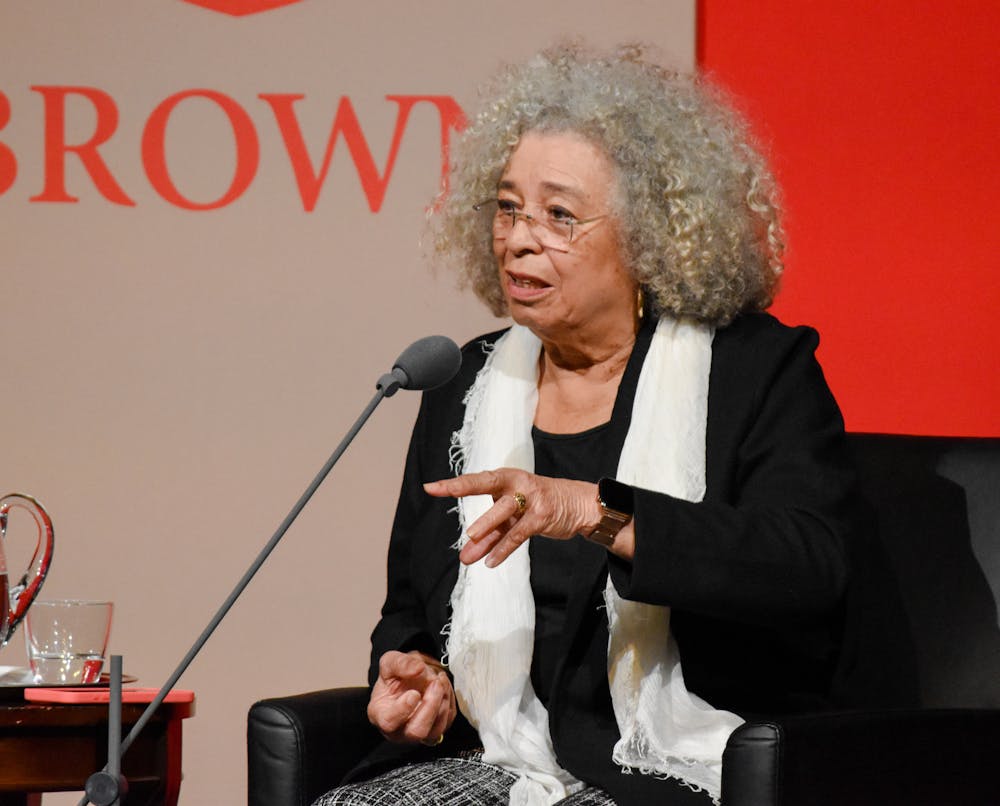Hundreds of community members packed into Salomon DECI auditorium Tuesday night to hear political activist Angela Davis discuss social movements, history and Palestine at an event hosted by the Brown Center for Students of Color. The talk, titled “No one is free until we are all free: discussion on Black Radicalism & Global Solidarity,” was the latest installment of BCSC’s “Heritage Series.”
At the start of the event, BCSC student workers, many of whom wore keffiyehs, welcomed University Professor of Social Science Lina Fruzzetti, who then introduced Angela Davis as a social activism “icon.” Davis received a standing ovation from the audience.
Davis stated her excitement to be “on this campus at this moment” and said she has “come to really appreciate this campus and the contributions of students” over her many visits to campus in recent years.
Noting that pro-Palestine advocacy is one of her greatest values, Davis shared that she “learned about the Palestinian struggle from my progressive Jewish classmates” as an undergraduate at Brandeis University in the sixties.
Davis added that Palestine is a “moral litmus” test of the current time. It’s important to “recognize (that) after all these years, vast numbers of people … are now standing up for Palestine,” she said.
Davis then shared that many who criticize the existence of Israel are, she believes, falsely labeled antisemitic.
“It’s so important to challenge antisemitism, to say no to antisemitism,” Davis added. “I grew up in the south in a time when the Klu Klux Klan targeted Black churches, but also Jewish synagogues.” She added that racism and antisemitism “deserve to be equally challenged.”
Davis ended her remarks by discussing systemic racism and the importance of institutions adapting to the needs of marginalized groups while dismantling practices that once marginalized these groups.
Davis then sat down across from Fruzzetti, who asked her about what activism looks like today compared to the civil rights movement.
“Nothing ever remains the same,” Davis said. “The reason why students and young people are always on the forefront of radical movements is because their ear is to the ground” and they know what is required to enact change when the moment comes, she said.
Then, Davis discussed sexism within the civil rights movement, saying that “women were not acknowledged” despite doing “practically all of the work.”
Regarding the Black Lives Matter movement and protests in 2020, Davis shared how institutions were being put under the microscope and “the largest mass uprising that has ever been experienced in this country” was calling for the abolishment or defunding of the police and other “repressive institutions.”
Davis ended by answering a question about the current violence in Sudan, remarking that many of the world’s horrors were enabled by colonialism and that antiracist movements must be guided by the “continued struggle against colonialism.”
Clarification: This has has been updated to better reflect Davis's characterization of Israel

Talia LeVine is a section editor covering arts and culture. They study Political Science and Visual Art with a focus on photography. In their free time, they can be found drinking copious amounts of coffee.





